Previous APRN Member Spotlight
March 2024 Luis Gino Guzman
Luis Gino (“Luigi”) Guzman, MSN, MHA, APN, FNP-BC, CEN, TCRN
Luis Gino (“Luigi”) Guzman grew up in the Philippines, where his mother works in a small community hospital, 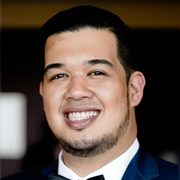 the place where his path to becoming an emergency nurse practitioner began. Guzman said he often went there after school, exploring to pass the time as he waited for his mother to finish work.
the place where his path to becoming an emergency nurse practitioner began. Guzman said he often went there after school, exploring to pass the time as he waited for his mother to finish work.
“The hospital was my playground. That was my after-school activity. I played with the nurses, the lab techs. I saw how they moved, and I saw how they helped people,” Guzman said.
Guzman earned his bachelor’s degree in nursing from De Los Santos-STI College, his master’s degree in Adult Health at St. Paul University Philippines and he has worked in several emergency and trauma departments. He recalled that in his third year of studies, he helped respond to a pediatric code. That event cemented his interest in emergency nursing, even though the child didn’t survive.
“I knew then that emergency was my passion,” he said. “I felt at that time I didn’t want to feel that pain for the parents. I wanted to help.”
After five years working in the Philippines, he moved to Bermuda to be the charge nurse in the island’s only emergency department. He later served as manager for quality and patient safety and clinical risk management. In that role, his led education about sepsis, both for groups around the island and among hospital staff. He also earned a master’s in health care administration from Walden University.
During his time in Bermuda, Guzman joined ENA and began attending the association’s annual conferences, recruiting his colleagues to join ENA along the way. The education was important, he said, because there weren’t many opportunities to access updated information where they were.
“Island medicine is different. There are less resources,” he said.
Guzman moved to Florida in 2019 where he worked in an emergency department in Tallahassee and completed a post-MSN certificate in Family Nurse Practitioner at University of Alabama. As an advanced practice nurse, he said he still felt at home in ENA.
“We have different kinds of challenges, but we need the voice and the advanced education (that ENA can provide),” he said. He also served a term on the Global Advisory Council and on the Emergency Nursing Conference Education Planning Committee prior to joining the Emergency Nursing Advanced Practice Advisory Council.
Guzman and his wife relocated to New Jersey in 2022 to be near her family. He currently works in the Hoboken University Medical Center ED, where he is a preceptor. He is also an adjunct faculty at William Paterson University of New Jersey.
Outside of work, Guzman volunteers for his county’s Medical Reserve Corps. He and other volunteers were most recently deployed to help with health exams and education for newly arrived migrants staying in New Jersey shelters.
After two master’s degrees, Guzman now has his sights set on earning one more degree next year. He is pursuing his Doctor of Nursing Practice through the University of Alabama, where his work is focused on street medicine. He wants to develop education for nurses that covers caring for and advocating for patients who are homeless, something he said he didn’t receive as a nursing student.
“I have a soft spot for them, because we are the only ones they can go to, the only ones they ask for help,” he said. “A homeless patient has different needs, a lot of history you need to ask so you know how to activate social services.”
February 2024 Jennifer Bevacqua
Jennifer Bevacqua, MS CPNP-AC/PC AG-ACNP CPEN CEN
Jennifer Bevacqua, MS CPNP-AC/PC AG-ACNP CPEN CEN, is a board-certified pediatric nurse practitioner (acute and primary care) as well as an adult-geriatric acute care nurse practitioner in Oregon. 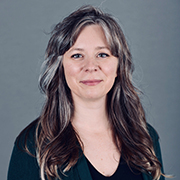 Much of her early career
was in pediatrics—in EDs, inpatient, and urgent care settings—in addition to precepting in nurse practitioner programs through Rush University School of Nursing and Texas Tech University Health Sciences Center and teaching didactic at
Oregon Health & Science University.
Much of her early career
was in pediatrics—in EDs, inpatient, and urgent care settings—in addition to precepting in nurse practitioner programs through Rush University School of Nursing and Texas Tech University Health Sciences Center and teaching didactic at
Oregon Health & Science University.
Several factors converged that led her to pivot into a community hospital’s emergency department in 2021. She completed her post master’s work as an adult-gerontology acute care nurse practitioner, was looking for a full-time position as an NP, and realized the current demand for her skills was in a general ED.
“The pandemic wasn’t hitting kids as hard (as adults),” she said. She was ready to shift her role to go where the need was greatest and work full time in an ED. She now works full time in the ED at Oregon Health & Science University Hillsboro Medical Center.
“Now I still get to see my babies and my toddlers and my kids, and I get to see sick adults too,” Bevacqua said. “There is such a need.”
Bevacqua is also passionate about professional issues that affect nurse practitioners, particularly scope of practice. She has worked with a coalition addressing state licensure issues, written on scope of practice issues in regard to acute care pediatrics, and also served on the Nurse Practitioners of Oregon’s Professional Practice Committee.
The ENAP Advisory Committee was a natural outlet for her to continue promoting the advanced practice specialty. Prior to that, she served for a term on ENA’s DEI Committee.
“I’m excited to continue work with ENAP and promote quality education for nurse practitioners,” she said.
Bevacqua said that even as a young child, she was always interested in anatomy and physiology. She earned her Bachelor of Science in nursing from Indiana University and her Master of Science, pediatric primary care nurse practitioner from Oregon Health & Sciences University. She continued her education with a post-master’s certificate, pediatric acute care nurse practitioner from Rush University, and a leadership certificate program from Harvard University School of Medicine & University College London before completing her last post-master’s adult-gerontology acute care nurse practitioner from Boise State University.
Bevacqua loves the wilderness and enjoys backpacking with her family throughout Oregon, and she has also worked as a camp nurse. Her love of the outdoors and desire to always be prepared prompted her to add the Advanced Wilderness Life Support certification to the numerous certifications she has achieved over the years
Whether it’s a fall, a surprise storm, or any other thing that can go wrong in the woods, she likes knowing that if someone in her party needs help, she could respond to it.
“I’ll know what to do, with no tools, no IVs,” she said.
June 2023 Vicki Bacidore
Vicki Bacidore, DNP, APRN, ACNP-BC, CEN
Vicki Bacidore is an emergency department nurse practitioner at Loyola University Medical 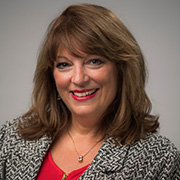 Center in Maywood, Illinois, and an assistant professor of nursing at Loyola University Chicago, where she is the DNP/AG-ACNP Program Track Director and the Associate Department
Chair for the Health Systems and Adult Health Nursing Department.
Center in Maywood, Illinois, and an assistant professor of nursing at Loyola University Chicago, where she is the DNP/AG-ACNP Program Track Director and the Associate Department
Chair for the Health Systems and Adult Health Nursing Department.
Bacidore has decades of experience in emergency nursing and education, with a longtime interest in toxicology and substance abuse disorders. She holds a bachelor’s degree in nursing/psychology from Elmhurst College, a master’s degree in organizational behavior and health care administration from Benedictine University, and a master’s and doctorate in acute care/emergency from Loyola University Chicago.
As part of her doctoral work, Bacidore implemented the alcohol screening, brief intervention and referral to treatment program in Loyola’s ED.
“I’ve always been interested in substance abuse disorders … I love toxicology and anything to do with taking care of patients that have those types of problems,” Bacidore said. SBIRT provides a screening protocol to identify people who come in for an injury or other urgent need who are also at risk for substance abuse. While still in the ED, at-risk patients can be connected to a social worker for education or resources to take home with them.
“I really thought (SBIRT) could make a difference (when) the patient was at that teachable moment in time,” Bacidore said. It is a protocol that ENA has promoted for a long time, she added, and she used some of ENA’s tools when introducing it in her own ED. Several of Bacidore’s graduate students have undertaken similar projects, developing protocols based on SBIRT to address opioids and substance withdrawal as well.
Bacidore said she was drawn to the “high intensity of the department and the teamwork” she witnessed in the ED during her first hospital job as an 18-year-old, part-time phlebotomist when she was in college.
“I was blown away by the environment,” she said. While pursuing her BSN, she simultaneously enrolled in an EMT program at a community college, which helped her land her first job as a nurse in an emergency department.
She joined ENA early in her career, is a past president of the Illinois ENA State Council and currently serves on several Illinois committees, including membership, education, evidence-based practice and spring symposium, and she recently began peer-reviewing for ENA’s Journal of Emergency Nursing. Bacidore has published in textbooks and peer-reviewed publications including the JEN and Advanced Emergency Nursing Journal. She also serves on the Illinois Poison Center’s advisory council.
“I’ve loved my time with ENA,” Bacidore said. “I want to stay involved as long as I can.”
May 2023 Audrey Snyder
Audrey Snyder, PhD, RN, CEN, CCRN, ACNP-BC, FNP-BC, FAANP, FAEN, FAAN
Audrey Snyder, PhD, RN, CEN, CCRN, ACNP-BC, FNP-BC, FAANP, FAEN, FAAN is a passionate 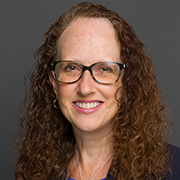 nurse practitioner, educator and researcher, who is board-certified as an acute care nurse practitioner and family nurse practitioner.
She has spent her 39 years in nursing in emergency, flight and critical care nursing and nursing education. She received her Diploma in Nursing in 1984 at The Memorial Hospital School of Nursing in Danville, Virginia; her RN-BSN in 1989; MSN in 1991;
Post Master’s ACNP certificate in 1998; and her PhD focused on nursing from the University of Virginia in 2007. She holds an FNP Post-Master’s Certificate from the University of Northern Colorado.
nurse practitioner, educator and researcher, who is board-certified as an acute care nurse practitioner and family nurse practitioner.
She has spent her 39 years in nursing in emergency, flight and critical care nursing and nursing education. She received her Diploma in Nursing in 1984 at The Memorial Hospital School of Nursing in Danville, Virginia; her RN-BSN in 1989; MSN in 1991;
Post Master’s ACNP certificate in 1998; and her PhD focused on nursing from the University of Virginia in 2007. She holds an FNP Post-Master’s Certificate from the University of Northern Colorado.
Audrey is a professor and associate dean for experiential learning and innovation in the School of Nursing at the University of North Carolina Greensboro; a nurse practitioner with the palliative medicine team that covers the emergency departments with Cone Health; and a member of the NC-1 Disaster Medical Assistance Team. She has taught multidisciplinary public health and disaster preparedness classes for more than 13 years and conducted research on disaster resilience.
She has experience in disaster preparedness and response internationally, having participated in earthquake responses in El Salvador and Haiti; refugee response at the United States-Mexico border; and by developing a disaster response in the Caribbean. Most recently, she helped educate nurses in Moldova as they work with refugees from Ukraine.
Her areas of specialization include emergency and critical care advanced practice nursing; disaster preparedness and response; public health, international health; community engagement; end-of-life care; and nursing education. Her research interests include interprofessional education; emergency nursing; disaster preparedness, resilience and response; evaluating methods to improve access to health care locally and globally; and nursing history. Her significant contributions have focused on disaster resilience; promoting access to care for rural and underserved populations; and decreasing barriers to access advanced education for rural nurses.
Audrey serves as the program director of the Transforming Primary Advanced Practice in Medically Underserved Communities HRSA Nursing Workforce Development grant; the Simulation, Education and Training HRSA grant; and the Mobile Health HRSA grant at UNC Greensboro. A new mobile health program will increase access to health care for residents of rural and underserved communities in North Carolina’s Piedmont region. She has a passion for building working teams to address community and educational needs.
She has been honored as a Fellow in the American Academy of Nurse Practitioners, the Academy of Emergency Nurses and the American Academy of Nursing.
April 2023 Darleen A. Williams
Darleen A. Williams DNP, APRN-CNS, CEN, CCNS, CNS-BC, EMT-P, is currently practicing as an APRN-CNS serving as the clinical education manager 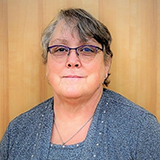 for Orlando Health’s Hospital Care at Home Program. She has been working collaboratively as a member of the leadership team
in the development and implementation of this innovative program. One of this program goals is to offer admitted emergency department patients who meet screening criteria an alternative admission to being held for an inpatient bed. Prior to moving
to this position, Darleen practiced in the ED and trauma center for 37 years as a staff nurse, educator, and the last 17 years as the clinical nurse specialist.
for Orlando Health’s Hospital Care at Home Program. She has been working collaboratively as a member of the leadership team
in the development and implementation of this innovative program. One of this program goals is to offer admitted emergency department patients who meet screening criteria an alternative admission to being held for an inpatient bed. Prior to moving
to this position, Darleen practiced in the ED and trauma center for 37 years as a staff nurse, educator, and the last 17 years as the clinical nurse specialist.
Darleen has been an active ENA member since 1983 and a certified emergency nurse since 1985. She has held positions at the local, state, and national levels throughout her career. She has served as president and treasurer for her local Greater Orlando Chapter and has also been the Florida ENA president. Darleen is currently the co-chair of the Florida ENA Advanced Practice Committee.
In addition, Darleen has also participated on the ENA Nominations and Elections Committee and served on the Board of Certification for Emergency Nurses as an item writer, member of the exam construction and review committee, and member and officer on the BCEN board of directors. Darleen is currently a section editor of the Advanced Emergency Clinicians Corner in the Journal of Emergency Nursing.
Darleen has been married to her husband Larry, who is also an emergency nurse for 45 years. They have three children and 14 grandchildren. The family is active in rescuing feral cats in their community.
March 2023 Julie Rossie
Julie Rossie, MS, RN, CNS, CCNS, CCRN, TCRN, is the assistant director of nursing clinical practice at Kaiser 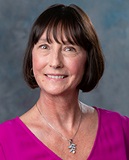 Permanente in California’s greater San Jose area with oversight in the emergency department, and ambulatory clinics on the main
San Jose campus and four satellite clinics in the surrounding area. She is a graduate from the Critical Care/Trauma Clinical Nurse Specialist program at University of California San Francisco. Her clinical background includes critical care, emergency,
and trauma nursing with over seventeen years as a clinical nurse specialist.
Permanente in California’s greater San Jose area with oversight in the emergency department, and ambulatory clinics on the main
San Jose campus and four satellite clinics in the surrounding area. She is a graduate from the Critical Care/Trauma Clinical Nurse Specialist program at University of California San Francisco. Her clinical background includes critical care, emergency,
and trauma nursing with over seventeen years as a clinical nurse specialist.
As the assistant director, she is responsible for performance improvement, quality assurance, maintenance of practice standards and identifying and interpreting clinician scope of practice in the outpatient environment. Additionally, she is the clinical consultant for the COVID-19 vaccine and testing programs in her service area.
She has been actively involved in ENA at the local, state and national levels. She is currently California ENA’s leadership and practice chair and is actively involved in General Assembly as a California delegate. She is passionate about the advanced practice role and involved in development of the emergency CNS competencies through ENA. She was involved in the beta testing of the BCEN trauma certification exam. Her interests include triage accuracy, emergency nursing quality measures, trauma and geriatric emergency care.
October 2022 Sharon Vanairsdale Carrasco
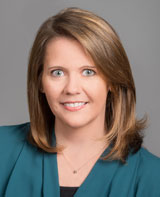 Sharon Vanairsdale Carrasco, DNP, APRN, ACNS-BC, NP-C, CEN, FAEN, FAAN, FNAP, is an associate professor in the Nell Hodgson Woodruff School of Nursing at Emory University. She is the program director of the Region 4 Ebola and Other Special Pathogen Treatment Center based out of Emory University Hospital.
Sharon Vanairsdale Carrasco, DNP, APRN, ACNS-BC, NP-C, CEN, FAEN, FAAN, FNAP, is an associate professor in the Nell Hodgson Woodruff School of Nursing at Emory University. She is the program director of the Region 4 Ebola and Other Special Pathogen Treatment Center based out of Emory University Hospital.
As the program director, she manages unit readiness and hospital preparedness for patients with special pathogens and has been involved with COVID-19 pandemic response at Emory. Sharon is also the director of education for the National Emerging Special Pathogens Training and Education Center, a training program to prepare health care workers to safely and effectively manage patients with special pathogens.
She is a fellow in the Academy of Emergency Nurses and the American Academy of Nursing, as well as a Distinguished Fellow in the National Academies of Practice. In 2016, she was awarded the American Nurses Credentialing Center Magnet Nurse of the Year for Exemplary Professional Practice and the March of Dimes Nurse of the Year for Nursing Administration.
April 2022 Craig Nuttall
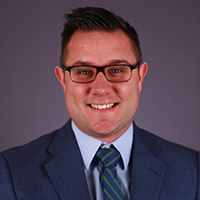 Dr. Craig Nuttall is a dual certified emergency and family nurse practitioner. He obtained his MSN from Brigham Young University and His DNP from the University of Arizona. He also holds the Diploma in Mountain Medicine from the International Mountain Medicine Center. He is currently working as an associate teaching professor at Brigham Young University where he teaches in the family nurse practitioner program. Craig maintains a clinical practice in the emergency department at Timpanogos Regional Hospital in Orem, Utah.
Dr. Craig Nuttall is a dual certified emergency and family nurse practitioner. He obtained his MSN from Brigham Young University and His DNP from the University of Arizona. He also holds the Diploma in Mountain Medicine from the International Mountain Medicine Center. He is currently working as an associate teaching professor at Brigham Young University where he teaches in the family nurse practitioner program. Craig maintains a clinical practice in the emergency department at Timpanogos Regional Hospital in Orem, Utah.
His research focuses on patient care at high altitudes and resource-limited environments. Over the past several years he has been working with the Nehru Institute of Mountaineering and the All India Institute of Medical Sciences to improve search and rescue and health care access in the Himalayas. He received the 2020 Rivers Foundation Explorer Award for Health and Humanities by the Scientific Exploration Society for his work training search and rescue workers in the Garhwal Mountain range.
In response to his work in 2020 with patients during the COVID- 19 pandemic, Craig developed the Stethogram 3D printed digital stethoscope and iOS app. This open- source stethoscope is used by nurses and other health care providers to assess their patients suffering from COVID- 19 while still wearing appropriate PPE and maintaining a safe distance from the patient. This device is now being used in hospitals and for telemedicine to help protect health care providers and patients with COVID- 19 around the world.
March 2022 Michael D. Gooch
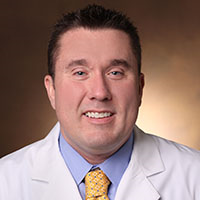 Michael D. Gooch, DNP, APRN, CCP, is board certified as an acute care, family, and emergency nurse practitioner. He is also board certified as an emergency, flight, transport and trauma nurse. He has more than 25 years of emergency and transport medicine experience. He obtained his MSN from Vanderbilt University and his DNP from Loyola University Chicago. He is an assistant professor of nursing with the Vanderbilt University School of Nursing, as well as faculty with the Middle Tennessee School of Anesthesia. He has completed more than 1,500 patient transports during his tenure with Vanderbilt University Medical Center’s LifeFlight transport program. At Vanderbilt, he also serves as an emergency nurse practitioner in the patient flow center and, with TeamHealth in a community emergency department.
Michael D. Gooch, DNP, APRN, CCP, is board certified as an acute care, family, and emergency nurse practitioner. He is also board certified as an emergency, flight, transport and trauma nurse. He has more than 25 years of emergency and transport medicine experience. He obtained his MSN from Vanderbilt University and his DNP from Loyola University Chicago. He is an assistant professor of nursing with the Vanderbilt University School of Nursing, as well as faculty with the Middle Tennessee School of Anesthesia. He has completed more than 1,500 patient transports during his tenure with Vanderbilt University Medical Center’s LifeFlight transport program. At Vanderbilt, he also serves as an emergency nurse practitioner in the patient flow center and, with TeamHealth in a community emergency department.
Michael is actively involved in advancing ENP. He is a founding member of the American Academy of Emergency Nurse Practitioners and serves as the southeastern regional director. He is an APRN liaison to the Air and Surface Transport Nurses Association’s board of directors and is a member of the the ENA’s Advanced Practice Advisory Council.
Michael is a nationally recognized speaker and published author on varied emergency and transport medicine topics. He serves as a column editor for the Advanced Emergency Nursing Journal. His clinical interests include transport medicine, airway management, toxicology, and pharmacology.
January 2022 Chris Dellinger
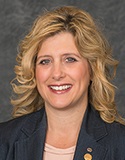 Chris Dellinger, MBA, BSN, RN, FAEN, is the Secretary/Treasurer of the Emergency Nurses Association and is in her third year on the board. She is currently the director
of trauma services and specialty care services. Dellinger has served in various roles within ENA at the local, state and national levels, including many years as the West Virginia ENA State Council president and the state’s pediatric chairperson.
Dellinger has served as an instructor and faculty for TNCC and ENPC, ENA’s premier courses. She has been part of ENA’s Course Administrative Faculty Committee and the Conference Education Planning Committee. Dellinger was instrumental
in partnering with her state ACEP physician group to hold an annual summit. She is the immediate past president of the Mountain State Trauma and Injury Prevention Coalition and is the appointed registered nurse to the State Medical Review Committee.
Chris Dellinger, MBA, BSN, RN, FAEN, is the Secretary/Treasurer of the Emergency Nurses Association and is in her third year on the board. She is currently the director
of trauma services and specialty care services. Dellinger has served in various roles within ENA at the local, state and national levels, including many years as the West Virginia ENA State Council president and the state’s pediatric chairperson.
Dellinger has served as an instructor and faculty for TNCC and ENPC, ENA’s premier courses. She has been part of ENA’s Course Administrative Faculty Committee and the Conference Education Planning Committee. Dellinger was instrumental
in partnering with her state ACEP physician group to hold an annual summit. She is the immediate past president of the Mountain State Trauma and Injury Prevention Coalition and is the appointed registered nurse to the State Medical Review Committee.
In 2017, she was chosen as the 2016 Leader of the Year at WVU Medicine Camden Clark Medical Center. She is a Fellow in the Academy of Emergency Nursing. Dellinger earned her bachelor’s degree in nursing from West Virginia at Parkersburg in 2008 and later went on to complete her MBA with an emphasis in Health Care Administration from Salem University in 2017. With her willingness to make critical decisions, Dellinger continues to be dedicated to ENA’s mission and commitment to care by promoting the tools to make the clinical practice safer, while protecting the emergency nurse, their patients and their families.
December 2021 Nancy Denke
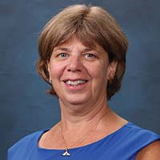 Nancy Denke DNP, ACNP-BC, FNP-BC, FAEN, CEN, CCRN, has worked in various roles in emergency care, neurology/stroke and toxicology over the last 43 years. Nancy holds a Bachelor’s degree from the Pennsylvania State University; received her CNS and FNP from the University of North Carolina; and earned her ACNP from St. Louis University. Most recently, she received her DNP-Innovation in Leadership from Arizona State University. She is currently a full-time toxicology nurse practitioner with Toxicology Consultants of Arizona, where she cares for patients of all ages at three different hospitals. Her practice includes overdoses, altered mental status and envenomation patients. In her free time, she is a part-time DNP faculty member at ASU. She has been an active ENA member the last 43 years, holding several leadership positions with the Kansas, North Carolina, Colorado and Arizona ENA state councils. She has served on many ENA volunteer committees, most recently as the 2018 chairperson for the Academy of Emergency Nursing and now as chair of the Emergency Advanced Practice Committee. In these positions, she was able to work with her committee to launch the ENA Mentoring program and the APRN library.
Nancy Denke DNP, ACNP-BC, FNP-BC, FAEN, CEN, CCRN, has worked in various roles in emergency care, neurology/stroke and toxicology over the last 43 years. Nancy holds a Bachelor’s degree from the Pennsylvania State University; received her CNS and FNP from the University of North Carolina; and earned her ACNP from St. Louis University. Most recently, she received her DNP-Innovation in Leadership from Arizona State University. She is currently a full-time toxicology nurse practitioner with Toxicology Consultants of Arizona, where she cares for patients of all ages at three different hospitals. Her practice includes overdoses, altered mental status and envenomation patients. In her free time, she is a part-time DNP faculty member at ASU. She has been an active ENA member the last 43 years, holding several leadership positions with the Kansas, North Carolina, Colorado and Arizona ENA state councils. She has served on many ENA volunteer committees, most recently as the 2018 chairperson for the Academy of Emergency Nursing and now as chair of the Emergency Advanced Practice Committee. In these positions, she was able to work with her committee to launch the ENA Mentoring program and the APRN library.
Nancy enjoys contributing to the clinical training of nurse practitioners and nursing students, and as a mentor for active-duty Air Force nurses in the Critical Care/Emergency Trauma Nurse Fellowship Program at Scottsdale Healthcare. She has presented numerous times about emergency, toxicology, trauma nursing and medicine topics to local, state, national and international audiences, and has published numerous papers related to these subjects.
November 2021 David T. House
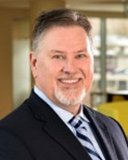 David T. House, DNP, CRNP, ENP-C, FNP-BC, CNS, CEN, CNE, FAEN, is an assistant professor at the University of Alabama at Birmingham School of Nursing. He is specialized in emergency services with 20 years of experience in administrative and clinical roles. He serves on faculty for both the graduate and doctoral tracks at UAB, as well as co-coordinator of the Emergency Practitioner Pathway. House received his Doctor of Nursing Practice from Vanderbilt University in 2016, is a Scholar with the UAB Center for Interprofessional Education and Simulation and is also a Fellow of the 2019-2020 UAB Interprofessional Leadership program. A lifetime ENA member, House is currently the past-chair of the ENAP Advisory Council having served on the council from 2019-2021 and as chair in 2020. In 2021, he was inducted into the Academy of Emergency Nursing. He has also contributed to ENA as a member of the ENP and CNS Competency Workgroups and on the Conference Education Planning Committee for EN20X and Emergency Nursing 2021.
David T. House, DNP, CRNP, ENP-C, FNP-BC, CNS, CEN, CNE, FAEN, is an assistant professor at the University of Alabama at Birmingham School of Nursing. He is specialized in emergency services with 20 years of experience in administrative and clinical roles. He serves on faculty for both the graduate and doctoral tracks at UAB, as well as co-coordinator of the Emergency Practitioner Pathway. House received his Doctor of Nursing Practice from Vanderbilt University in 2016, is a Scholar with the UAB Center for Interprofessional Education and Simulation and is also a Fellow of the 2019-2020 UAB Interprofessional Leadership program. A lifetime ENA member, House is currently the past-chair of the ENAP Advisory Council having served on the council from 2019-2021 and as chair in 2020. In 2021, he was inducted into the Academy of Emergency Nursing. He has also contributed to ENA as a member of the ENP and CNS Competency Workgroups and on the Conference Education Planning Committee for EN20X and Emergency Nursing 2021.
October 2021 Kimberly R. Brandenburg
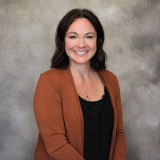 Kimberly R. Brandenburg, MSN, APRN, FNP-C, CEN, CPEN, has worked in emergency care, trauma, and critical care for the last 24 years. She graduated from Nebraska Wesleyan University with her BSN from Bryan College of Nursing, earned her MSN in education at Nebraska Wesleyan University and obtained her FNP from Clarkson College in Omaha, Nebraska. She has filled several roles in the ED over the years including as a trauma program manager and clinical educator. She currently works full time as a nurse practitioner in the critical access setting, caring for patients of all ages in the clinic, inpatient setting, emergency department and as a PRN at a Level III Trauma Center.
Kimberly R. Brandenburg, MSN, APRN, FNP-C, CEN, CPEN, has worked in emergency care, trauma, and critical care for the last 24 years. She graduated from Nebraska Wesleyan University with her BSN from Bryan College of Nursing, earned her MSN in education at Nebraska Wesleyan University and obtained her FNP from Clarkson College in Omaha, Nebraska. She has filled several roles in the ED over the years including as a trauma program manager and clinical educator. She currently works full time as a nurse practitioner in the critical access setting, caring for patients of all ages in the clinic, inpatient setting, emergency department and as a PRN at a Level III Trauma Center.
She has been an active member of ENA for the last 16 years; in several leadership positions the Nebraska ENA State Council; was the Chairperson for the 2019 ENA Conference Education Planning Committee and served as Innovation Lead in 2020 and 2021. She has lectured at the national level on trauma, leadership, and concussion treatment and is passionate on delivering an evidence-based approach to chronic disease management, which directly affects the ED patient population. She plans to obtain board certification over the next year. She also specializes in adult concussion and TBI, and is the APRN lead for the Adult Concussion Clinic one day a week in her hometown. For the last seven years, she has taught as an ad hoc professor in the MSN program at Nebraska Wesleyan University. In addition to ENA, she is a member of the American Association of Nurse Practitioners, Brain Injury Association of America, and the American College of Lifestyle Medicine.
September 2021 William Fiebig
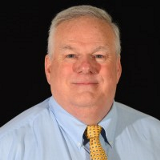 William Fiebig, DNP, APRN, AGACNP-BC, ENP-C, FNP-BC, CEN, NREMT-P, has been involved in some form of emergency care for the past 45 years. After starting his career in EMS and Fire, he then went on to nursing school, graduating from the Union Memorial Hospital School of Nursing in Baltimore. He would go on to obtain his BSN at the University of Phoenix and later he graduated from the University of South Alabama emergency dual role (FNP/AGACNP) NP program in 2016 before, and then completing his DNP in 2019. His doctorate project involved a performance improvement project to reduce the door-to-CT and door-to-needle times in acute ischemic stroke.
He is an ACLS, PALS, BCLS, TNCC and ENPC instructor, as well as a member of several organizations, including: Sigma Theta Tau, American Academy of Emergency Nurse Practitioners, Emergency Nurses Association, and the American Association of Critical-Care Nurses. His special interests include emergency nursing education, emergency medical services – education and operations, and critical care in the ED setting, and disaster preparedness.
Throughout his career, he has spent time in emergency nursing, critical care nursing, nursing management, emergency education, air and ground critical care transport, trauma program management, and as an Emergency Nurse Practitioner. He currently serves a staff advanced practice provider at Hoke Hospital in Raeford North Carolina.
In addition to his clinical position, he is an assistant professor at the Rocky Mountain University of Health Professions College of Nursing in the Emergency Nurse Practitioner program, and an adjunct instructor for the FNP/ENP program at the University of South Alabama.
William Fiebig, DNP, APRN, AGACNP-BC, ENP-C, FNP-BC, CEN, NREMT-P, has been involved in some form of emergency care for the past 45 years. After starting his career in EMS and Fire, he then went on to nursing school, graduating from the Union Memorial Hospital School of Nursing in Baltimore. He would go on to obtain his BSN at the University of Phoenix and later he graduated from the University of South Alabama emergency dual role (FNP/AGACNP) NP program in 2016 before, and then completing his DNP in 2019. His doctorate project involved a performance improvement project to reduce the door-to-CT and door-to-needle times in acute ischemic stroke.
He is an ACLS, PALS, BCLS, TNCC and ENPC instructor, as well as a member of several organizations, including: Sigma Theta Tau, American Academy of Emergency Nurse Practitioners, Emergency Nurses Association, and the American Association of Critical-Care Nurses. His special interests include emergency nursing education, emergency medical services – education and operations, and critical care in the ED setting, and disaster preparedness.
Throughout his career, he has spent time in emergency nursing, critical care nursing, nursing management, emergency education, air and ground critical care transport, trauma program management, and as an Emergency Nurse Practitioner. He currently serves a staff advanced practice provider at Hoke Hospital in Raeford North Carolina.
In addition to his clinical position, he is an assistant professor at the Rocky Mountain University of Health Professions College of Nursing in the Emergency Nurse Practitioner program, and an adjunct instructor for the FNP/ENP program at the University of South Alabama.
August 2021 Steve Branham
August 2021 Steve Branham
Steve Branham PhD, RN, ACNP-BC, FNP-BC, ENP-C, FAANP, CCRN, has nearly four decades of progressive health care delivery experience. He started his career in Columbus, Ohio after 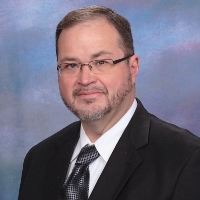 graduating from Central Ohio Technical Collage in 1980. Branham relocated to Las Vegas for 10 years serving as a charge nurse and nurse manager in the intensive care unit at Desert Springs Hospital. After completion of his BSN at the University of Phoenix, Branham relocated to Houston to enroll in graduate school with plans to become a certified registered nurse anesthetist.
graduating from Central Ohio Technical Collage in 1980. Branham relocated to Las Vegas for 10 years serving as a charge nurse and nurse manager in the intensive care unit at Desert Springs Hospital. After completion of his BSN at the University of Phoenix, Branham relocated to Houston to enroll in graduate school with plans to become a certified registered nurse anesthetist.
While in graduate school, Branham – a career critical care nurse became intrigued by the evolving new role for a nurse practitioner who had a substantial background in the care of the critically ill. He quickly enrolled in a new program at the University of Texas Medical Branch in Galveston designed to prepare acute care nurse practitioners and graduated with the inaugural class in 1996.
Branham’s contributions have included professor, manager, business owner and CEO. He completed doctoral work at Texas Woman’s University in 2011. His current university affiliations include associate professor in the Acute Care Nurse Practitioner Program at Texas Tech University and adjunct faculty at Texas Woman's University. He has provided instruction to more than 500 acute care nurse practitioners, as well as many other practicing nurse practitioners. Throughout his entire career, Branham has maintained an active clinical practice based on a firm belief that those teaching nurse practitioners should also practice as nurse practitioners. He is a frequent speaker at the local, state, and national levels on issues affecting the acute care nurse practitioner role, emergency care, business practices, telehealth and international issues related to the nurse practitioner role.
He is one of a few nurse practitioners in the nation authorized by the Society of Critical Care Medicine to serve as an independent course consultant for the Fundamental Critical Care Support Provider Course. In 2013, Branham was inducted as a Fellow of the American Association of Nurse Practitioners based on his professional contributions. Branham currently maintains an active clinical practice focused on critical care, emergency and tele-practice.
July 2021 Scott Stover
Scott Stover, DNP, APRN, ACNS-BC, NEA-BC, CPHQ, CEN, is a current member of the ENA Advanced Practice Council. Scott started his medical career nearly four decades ago as an Army combat medic. After earning his BSN, 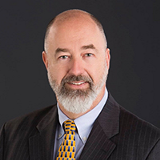 he continued to serve as a combat medic instructor during his 22 years in the military. An emergency clinical nurse specialist for almost 25 years, Scott has spent most of his career working as an emergency services director at large health systems in Texas.
he continued to serve as a combat medic instructor during his 22 years in the military. An emergency clinical nurse specialist for almost 25 years, Scott has spent most of his career working as an emergency services director at large health systems in Texas.
Additionally, he has worked as a critical care flight nurse, adjunct faculty for ADN, BSN and MSN programs, and as a volunteer firefighter/paramedic. He has served in ENA leadership positions at the chapter, state, and national levels. In 2017, Scott graduated with his DNP from the University of Texas Health Science Center at Houston. He currently works as a lead nursing quality specialist in Sarasota, Florida, where he is the president of the Manasota ENA chapter.
June 2021 Tresa Zielinski
Tresa Zielinski, DNP, RN, CPNP-PC, is a current member of the Emergency Nurses Association Advance Practice Council. She also serves on the Emergency Medical Services for Children National Pediatric Readiness Project 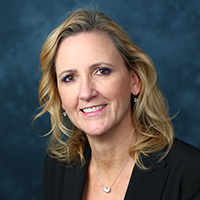 Steering Committee through the U.S. Department of Health and Human Services and is a past president of the National Association of Pediatric Nurse Practitioners and NAPNAP Partners. A pediatric nurse practitioner for more than 20 years, she earned her doctorate in nursing leadership focusing on quality improvement and nursing leadership in 2011 from Rush University. With a clinical focus in pediatric emergency medicine, Tresa has presented extensively at the national level on pediatric health care issues including pediatric kidney and cardiac disease, as well as emergency care and human trafficking. Prior to serving as NAPNAP’s president, she was president of its Illinois Chapter in 2005-06 and NAPNAP's executive board communications chair from 2009-13. Tresa has served on more than a dozen medical missions to Guatemala and was on the board of directors for Latin American Medical Providers a former non-profit organization. She remains involved with Rush University and Villanova University as a lecturer, mentor and preceptor.
Steering Committee through the U.S. Department of Health and Human Services and is a past president of the National Association of Pediatric Nurse Practitioners and NAPNAP Partners. A pediatric nurse practitioner for more than 20 years, she earned her doctorate in nursing leadership focusing on quality improvement and nursing leadership in 2011 from Rush University. With a clinical focus in pediatric emergency medicine, Tresa has presented extensively at the national level on pediatric health care issues including pediatric kidney and cardiac disease, as well as emergency care and human trafficking. Prior to serving as NAPNAP’s president, she was president of its Illinois Chapter in 2005-06 and NAPNAP's executive board communications chair from 2009-13. Tresa has served on more than a dozen medical missions to Guatemala and was on the board of directors for Latin American Medical Providers a former non-profit organization. She remains involved with Rush University and Villanova University as a lecturer, mentor and preceptor.
May 2021 Jake Miller
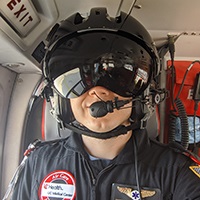 Hey everyone! My name is Jake Miller, I'm a Flight Nurse Practitioner and Clinical Nurse Specialist at UC Air Care in Cincinnati. My previous clinical background includes predominantly emergency department and flight nursing, in addition to over 15 years and counting of EMS practice as a paramedic. I originally grew up in Buffalo; went to graduate school in Baltimore; lived and worked for a few years in Cleveland before finally coming to Cincinnati. I'm a bit of an adventurer, loving to travel, hike, and getting lost (metaphorically, anyhow) in nature - so I have some catching up to do after the chaos of the past year. On the travel front, I'm looking forward to EN21 in Orlando, (and several other adventures, near and far, in between!
Hey everyone! My name is Jake Miller, I'm a Flight Nurse Practitioner and Clinical Nurse Specialist at UC Air Care in Cincinnati. My previous clinical background includes predominantly emergency department and flight nursing, in addition to over 15 years and counting of EMS practice as a paramedic. I originally grew up in Buffalo; went to graduate school in Baltimore; lived and worked for a few years in Cleveland before finally coming to Cincinnati. I'm a bit of an adventurer, loving to travel, hike, and getting lost (metaphorically, anyhow) in nature - so I have some catching up to do after the chaos of the past year. On the travel front, I'm looking forward to EN21 in Orlando, (and several other adventures, near and far, in between!
My own professional philosophy surrounds what I refer to as the "three pillars" of transport nursing: education, clinical excellence, and operational safety - essentially, anything that enhances our ability to understand and deliver the very best care to complex patients in a safe manner. To that extent, I applaud ENA's and this committee's work to extend these very tenets to the greater discipline of emergency nursing. I enjoy networking with others from diverse backgrounds, yet with a shared goal to understand, define, and the role of the APRN in emergency nursing.
April 2024 Chelsea M. Collins
Chelsea M. Collins, DNP, RN, APNP, ACCNS-AG, CEN, SANE-A, AFN-C
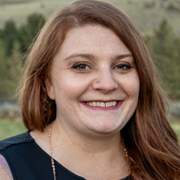
Chelsea Collins has worked in rural and urban EDs, legislative offices and in classrooms throughout her career-long quest to keep learning and growing professionally while advocating for nurses and patients. She is an advanced practice nurse prescriber and a clinical nurse specialist who lives in Wisconsin and works in Minnesota.
“Getting my advanced practice degree changed the way that I view nursing and how I understand the world,” Collins said, noting she always knew she would earn a terminal degree in whatever career she chose. “Formal or informal, advanced education, I do think, is very important in our profession. We are inundated with so much information and technology that if we don’t step up to the plate as individuals, we’re never going to be able to transform our profession or transform our practice.”
Collins joined ENA as a student and has been active in two state chapters. She currently co-chairs the Wisconsin State ENA government relations committee, and she also serves on the Wisconsin Nurses Association’s policy committee.
“One of the big things we’re trying to navigate is access to care, so we can do our best to advocate for best practices when it comes to APRNs and APNPs and have them advocate and work within their scope to meet the needs of the communities we’re serving,” she said.
In 2023, Collins spoke at ENA General Assembly in support of a resolution regarding the use of the title doctor for nurses who have completed doctoral education. In addition to ENAP Advisory Council, she is a current member of the ENA Foundation Scholarship Committee and previously served on the Resolutions Committee. .
“Involvement in ENA and networking and connections is a very powerful thing, and that’s why I continue to give back to ENA,” Collins said.
In addition to an ENA scholarship that helped her fund graduate school, she also “found this wonderful network of people I can reach out to, to me help navigate and give me a second set of eyes.”
In her current roles, Collins is a float nurse primarily working in critical care at University of Minnesota Masonic Children’s Hospital and teaching clinicals for St. Catherine University in Minneapolis. She is also a SANE, serving on the St. Croix Valley Sexual Assault Response Team, which covers parts of western Wisconsin and southeastern Minnesota.
Collins initially considered a career in forensic anthropology. One of her professors had been a labor and delivery nurse while pursuing her PhD in anthropology, and Collins decided to follow suit. She knew labor and delivery wasn’t what she wanted and quickly learned she loved emergency nursing. Her first job in the ED was in Denver, where she also volunteered as a state legislative policy fellow for the House Committee on Health and Insurance.
Collins’ first ED experience actually came years earlier, when she was a 14-year-old volunteer in an Idaho hospital. She recalled watching efforts save a man who had been injured in an industrial accident at a fertilizer plant.
“I remember watching them in the trauma bay treat this guy and doing everything they could to advocate for this patient,” Collins said. “The moment when they decided stop efforts, and everybody was just defeated they couldn’t save this individual, that vibe I remember distinctly. And I remember the charge nurse that I was following, how he navigated talking with the patient's wife and explaining things. That I always carried with me.”
